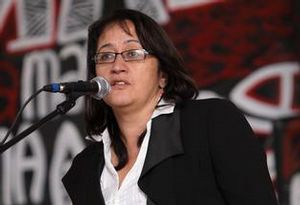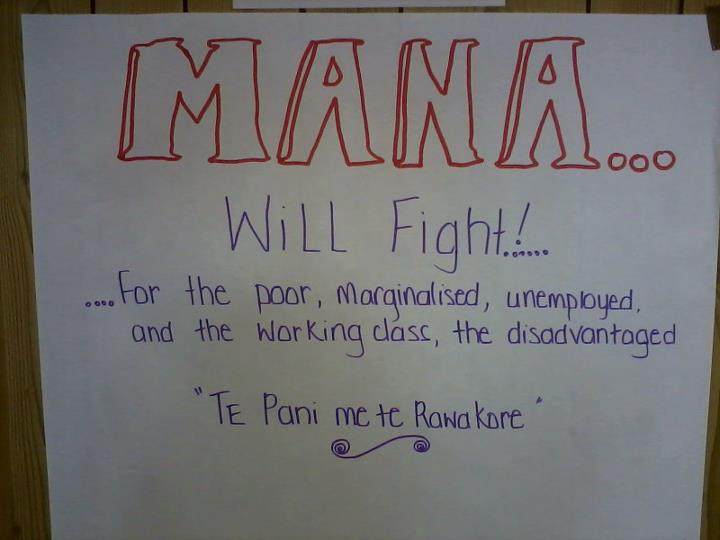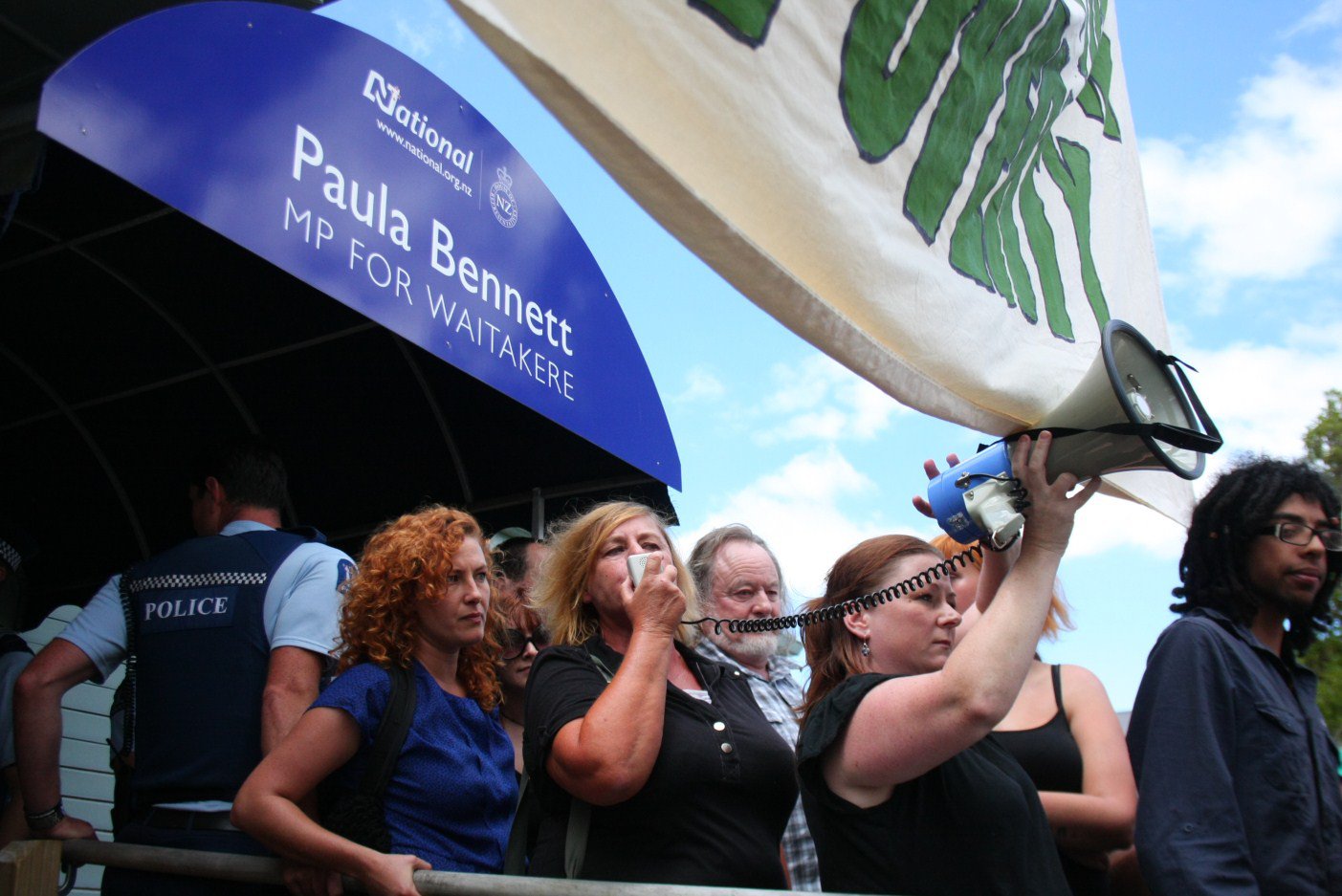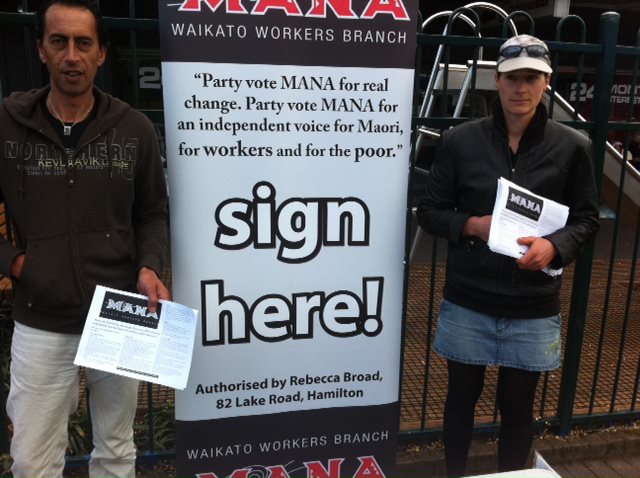Drawn from our experiences in Mana this article by Jared Phillips puts forward a socialist appraisal of the party so far. Originally published in the October issue of the Spark.
Formation of the Mana Party
 The Maori Party, after going into government with the National and Act parties fell into line and became supportive of anti-working class policies such as increasing GST (a consumer tax). As Maori Party MP for Te Tai Tokerau (the Northern-most Maori electorate) Hone Harawira opposed this and he wrote publically against the direction of the Maori Party. This is one example of how Hone stood out by not conforming to political pressure. It led to an internal dispute within the Maori Party in which Hone – in parliamentary terms – was in a minority.
The Maori Party, after going into government with the National and Act parties fell into line and became supportive of anti-working class policies such as increasing GST (a consumer tax). As Maori Party MP for Te Tai Tokerau (the Northern-most Maori electorate) Hone Harawira opposed this and he wrote publically against the direction of the Maori Party. This is one example of how Hone stood out by not conforming to political pressure. It led to an internal dispute within the Maori Party in which Hone – in parliamentary terms – was in a minority.
Essentially the Maori Party was a cross-class party, meaning it had no defined orientation to the working class and little orientation to working class or poor Maori in contrast to layers of Maori bourgeoisie. Our own socialist group was clear about this in relation to the Maori Party. However, we lacked the long-term political foresight to see that the class differences in the Maori Party would likely result in a rupture on class and social justice lines.
A further important catalyst for the formation of the Mana Party was the introduction of the Marine and Coastal (Takutai Moana) Act 2011 by the National/Act/Maori parliamentary majority. The Takutai Moana Act repealed Labour’s Foreshore and Seabed Act 2004 (F&S Act). Labour’s F&S Act had dispossessed Maori of the right to take a case regarding title over foreshore and seabed areas to the Maori Land Court, a right which had been won in a Court of Appeal case. Whilst the F&S Act brought all such areas under Crown ownership (aside from areas with private title), the Takutaimoana Act brings such areas under ‘common ownership’ meaning such areas cannot be owned. Therefore there is still no right for Maori to claim title over such areas, although there is a right to make claims for protected custody rights. Maori-led criticism of the Act is also based on the extraordinarily high threshold of proof showing customary use dating back to 1840 that is required in order to acquire protected custody under the Act. This led to a significant support and membership departure from the Maori Party to the Mana Party and to a more forceful insistence on Treaty-based rights.
Separate to the above-described process, and on a smaller scale, another process had been taking place since October 2010 involving leftists. There were some discussions amongst leftists – of both the far-left and of left-social democratic persuasion – about the idea of forming a new left party. There were media rumours about a new party being formed by Sue Bradford and Matt McCarten. The most formal of these discussions took place at a left dialogue meeting at the end of Unite Union’s first national conference in November 2011. Generally there was an apprehension about the formation of a new left party because of the low level of class struggle in New Zealand. Matt McCarten of Unite and Joe Carolan of Socialist Aotearoa were amongst the strongest in favour of proceeding with such a project.
When the contradiction between the Maori Party and Harawira came to a conclusion, many of those who had participated in the ‘new left party’ discussion, and others from active left tendencies, took an open approach to Mana and most soon decided to participate, help build, and make a contribution to shape the Mana Party.
Socialist involvement
As Mike Kay wrote in a Workers Party internal document:
‘For Marxists relating to broader movements, policy is indeed important, and something we spend a lot of energy trying to influence. But it is not all-determining. I think the major determinants of the viability of working in such a movement are (i) its class composition and (ii) the amount of democratic space within it.’
Mana is not a socialist party, but it is a genuinely progressive party. As well as its combative approach to Maori injustice, what makes Mana an important progressive force is the interface of its class composition, its leadership, its policy, its democratic space, and the class/community outlook of the non-socialist activists involved, who are the majority of the party membership.
The main active socialist groups – Socialist Aotearoa, Workers Party, Socialist Worker, and International Socialist Organisation have contributed to Mana work. So to have activists from other formations such as Citizens Against Privatisation and Rotorua Peoples’ Centre.
 Class composition
Class composition
Because Mana is a new organisation there is no statistical data available on its class composition. Largely the members we have met are manual and professional workers, unemployed, students, and the retired, as well as some academics and self-employed with small businesses. It is reasonable to say that the membership is comprised of basic masses and holds little attraction for capitalists or the rich. Many of the established activists have valuable experience in both activism and party-building which socialists can learn from. New layers of activists are coming up through quickly growing Rangatahi (youth) branches. Further, a national Mana Kaimahi network has been formed for trade union progressives.
Democratic space
The most primary organisational formation within Mana is the branch. All sorts of branches have been formed, with encouragement from the leadership, and this is why members like to define Mana more broadly as a movement. Branches participate within wider rohe, which is an organisational unit covering each Maori electorate. Each rohe is comprised of the members residing in it and has a committee comprised of elected chair, elected secretary, and elected treasurer. Additionally each branch with 20-plus members gains representation on the rohe committee. In cases in which branches build membership of over 100 members those branches are able to have two representatives on their rohe committee. Rohe are then represented in national decision-making. This means that gaining representation is achievable for forces that are prepared to help build and that wish to contribute to decision-making.
Leadership
 Important class-fighters in the leadership of Mana include John Minto, Matt McCarten, Mike Treen, and Gerard Hehir who have consistently fought for the interests of the lowest paid workers in the country for the past six years in Unite, each bringing decades of working class campaigning experience. Mike Treen and Syd Keepa (National Distribution Union) have initiated the Mana Kaimahi Workers Network. Beneficiary advocate-then-Green MP Sue Bradford, who took responsibility for the parliamentary aspect of the struggle to end youth rates, made a left break from the Green Party (whilst still an MP) and has now been announced as a general seat candidate. She will be standing against Paula Bennett, National’s Minister of Social Development. Bennett is the government’s chief beneficiary-basher against those who rely on welfare.
Important class-fighters in the leadership of Mana include John Minto, Matt McCarten, Mike Treen, and Gerard Hehir who have consistently fought for the interests of the lowest paid workers in the country for the past six years in Unite, each bringing decades of working class campaigning experience. Mike Treen and Syd Keepa (National Distribution Union) have initiated the Mana Kaimahi Workers Network. Beneficiary advocate-then-Green MP Sue Bradford, who took responsibility for the parliamentary aspect of the struggle to end youth rates, made a left break from the Green Party (whilst still an MP) and has now been announced as a general seat candidate. She will be standing against Paula Bennett, National’s Minister of Social Development. Bennett is the government’s chief beneficiary-basher against those who rely on welfare.
Others in the national leadership who stand in Maori justice traditions are doing so in good class terms. In a recent Otago University-sponsored interview the interviewer Bryce Edwards asked Hone about his standing alongside class warriors. Hone replied that he’s always been committed to those issues, standing on picket lines with them. Annette Sykes in 2010 delivered her Politics of the Brown Table lecture which challenged those Maori entities which she said, “are all harnessing Maori to a global capitalism that impoverishes the mass of working class Maori making them dependent on its survival”. Annette, along with John Minto, is a co-vice-president of Mana.
Relationship to non-socialists in the Mana movement
As well as fighting against injustice for Maori, Mana’s activists mostly have allegiance with basic pro-working class positions on issues such as – for example – cost of living, employment, health, and education. Whilst socialists are a minority in Mana, and Marxian socialists may be an even smaller minority, an even smaller minority would probably be Mana supporters who are uncomfortable about working alongside socialists (and/or pakeha for that matter). In any such case it would be up to the genuine left to prove it is up to the challenge of distinguishing itself in practice from the establishment left which has sold out Maori and fails to champion the working class.
Policy
The Mana Party is putting forward policies which include a range of radical measures in health, education, cost of living, employment, and social well-being, that are pro-worker, pro-poor, and which would benefit the majority of Maori, as they would the working class, instead of empowering and enriching ‘the brown table’. Mana policy, much of it still in draft form is available for viewing here. Immigration is one area in which Socialists have put forward formal remits. This is in regard to a policy which stated that public sector and Iwi corporate entities should face penalties for not employing New Zealand citizens. Although it was not the intention, the policy could potentially be seen as anti-immigrant.
Mana is largely comprised of a working class base, it has a high level of both formal and real democracy, it has a leadership of genuine working class activists and Maori sovereignty activists who are pro-working class, and it has radical pro-working class measures in its policy. To generalise, there are three reasons as to why it is important for socialists to participate in Mana. The first is that it will strengthen relationships with other activists and masses. Secondly, Mana can play a role in rebuilding constituency and solidarity amongst workers, oppressed, and marginalised sections of Aotearoa. The third reason is that Mana has the potential to play a significant role in re-starting critical public-level discussion around Maori, class, and social issues in Aotearoa.
What are WP members doing in Mana?
 – In mid-June we passed a national resolution stating that “We welcome the formation of a Maori-led class-based party and intend to engage with it in a constructive manner.”
– In mid-June we passed a national resolution stating that “We welcome the formation of a Maori-led class-based party and intend to engage with it in a constructive manner.”
– In the Te Tai Tokerau electorate Workers Party member Mike Kay is elected as vice-chair of the North Shore branch and was active in the successful by-election in June.
– In Hauraki-Waikato electorate we have established the Mana Waikato Workers Branch with enough members to have an additional representative on the Rohe (area of Maori electorate) committee. A branch member who is a railway delegate, is nominated for the Mana candidacy in the Hamilton West seat. Workers Party member Rebecca Broad is elected secretary of the Rohe Committee and is elected to represent the Rohe in national executive meetings.
– Another of our members – Heleyni Pratley – has been elected to represent a Rangitahi branch in Wellington.
– In mid-September 2011 we carried a national resolution to continue our participation in Mana as according to regional decision-making by our members.

Just another WordPress site
In 2004 “Labour’s F&S Act had dispossessed Maori of the right to take a case regarding title over foreshore and seabed areas to the Maori Land Court, a right which had been won in a Court of Appeal case.”
Has WP repudiated (or critiqued) its 2004 position on the F&S Act and the protests against the Act? I think ACA-WP had a flawed and absentionist position at the time. If I went back in time, that is something I would do differently.
Workers Party argue: “there are three reasons as to why it is important for socialists to participate in Mana. The first is that it will strengthen relationships with other activists and masses.” Secondly, Mana can play a role in rebuilding constituency and solidarity amongst workers, oppressed, and marginalised sections of Aotearoa. The third reason is that Mana has the potential to play a significant role in re-starting critical public-level discussion around Maori, class, and social issues in Aotearoa.”
I would very much like to believe all that was the case, but have some questions.
Socialist participation in Mana requires two main components; practical work with non socialist Mana members to advance commonly held policies and debate with non socialist Mana members to advance revolutionary socialist ideas. There is no problem with the former activity, but past communist experiences with the Labour party and the Alliance show that any serious attempt by revolutionaries to implant their ideas in a social democratic party brings rapid destruction of relationships.
As comrades from the CPNZ, SAL, WCL and PRG can attest.
At present, Mana’s main focus is on the election of a few individuals to parliament. Such a focus sets the role of activists as getting the vote out and the role of the masses as voting on the day.
As far as I can see, Mana has no concrete mass campaigning strategy outside of winning parliamentary votes.
For Mana to really be any sort of movement “rebuilding … solidarity amongst workers, oppressed, and marginalised sections of Aotearoa “ would require the formation of considerable, inspired and sustained extra- parliamentary political activity.
( I have no idea what is meant above by “constituency”. In ordinary usage the word simply describes the voters or residents in an electoral district)
Mana may have “ the potential to play a significant role in re-starting critical public-level discussion around Maori, class, and social issues in Aotearoa.” I hope it does.
To realise that rather big ask Mana will need to construct and maintain socially impacting extra- parliamentary campaigns as well as the election to parliament of two or three individuals.
@Ben: At Workers’ Power 2011 we held a panel session on Maori Liberation; speakers were Annette Sykes, Bernie Hornfleck and myself.
My talk outlined the problems with previous Workers Party positions on Maori liberation which various comrades had raised, including in this article by Michael Kyriazopolous:
http://workersparty.org.nz/2010/09/15/book-review-encircled-lands-te-urewera-1820-%E2%80%93-1921-by-judith-binney-bridget-williams-books-2009/
and in relation to the foreshore and seabed debate, where as you said the WP was abstentionist, in a mass struggle of oppressed people.
The need to critically engage continues. In this series of articles relating to electoral parties we also discuss the problems with the Maori Party which developed out of that struggle.
“I think ACA-WP had a flawed and absentionist position at the time. If I went back in time, that is something I would do differently.”
Agree with Ben and confrim Ian’s comments. I think we had a poor position which held no weight or common cause with any actual social forces including working class Maori (infact ‘particularly’ not with working class Maori).
Thanks Ian and Jared. I think it would be a good idea to post or publish something to that effect. I take it that Ian’s talk was not written in advance of the panel discussion and so there is no text version?
No we aim to produce more material on the foreshore struggle, I’m writing an article on the East Cape struggle for the November Spark.
The talk was just a broad overview on the point that the WP is in transition, we need new materialist analysis rather than a rehash of that. Hope that makes sense.
Yes, that makes sense. Look forward to reading the November article. My thoughts are that it is important for a group to maintain a consistent approach, both across different issues and over time. When a position is changed (which in some cases is quite a correct thing to do), it is important to acknowledge and explain the change publicly.
Agree 100% Ben. The situation is, that “practice is ahead of theory” for us, as we focus on the increased level of activity at the moment. (Not just electoral activity, by the way, e.g. Mana-ites led the recent student protest and the broad anti-governemnt hikoi in Auckland over the last two weeks.)
The departure of the Redliners and the emergence of Mana has forced us to reassess a number of our positions. We currently are undergoing an internal discussion on issues such as the Treaty, Tino Rangatiratanga and the Foreshore & Seabed controversy, and hope to be able to publish some of the results of that in the not too distant future.